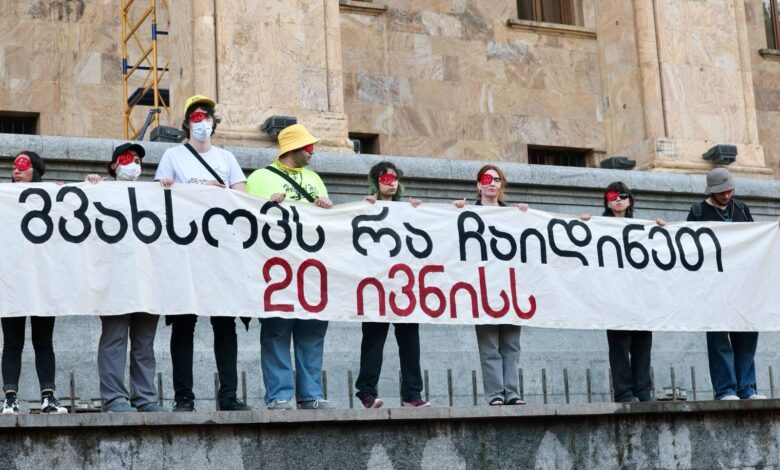
Prosecutors Revive Gavrilov’s Night Probe Citing 2024 ECtHR Ruling
The area in front of the parliament building in Tbilisi was cordoned off on July 11 in what prosecutors say are “investigative actions” over the 2019 “Gavrilov’s Night” rally dispersal, in response to last year’s ruling by the European Court on Human Rights (ECtHR) on the matter.
In May 2024, ECtHR ruled that authorities failed to properly investigate the incident, violating the procedural limb of Article 3 of the European Convention on Human Rights, which prohibits torture. The renewed scrutiny, however, comes as Georgian Dream authorities turn up the heat on Giorgi Gakharia, the leader of the opposition For Georgia party, who served as interior minister during the dispersal before his promotion as prime minister the same year.
“In light of the Strasbourg court ruling and recommendations, and to ensure an effective investigation with the involvement of victims, investigative actions are being carried out on Rustaveli Avenue,” the Prosecutor’s Office said in a July 11 statement. Officers temporarily blocked the avenue for investigative activities, which the Prosecutor’s office added aim to “fully reconstruct the crime scene and identify alleged offenders.”
The Prosecutor’s Office also noted that Georgia “was instructed to conduct specific investigative steps, including those involving victims, to determine whether the Interior Ministry’s operation was properly planned and whether excessive force was used.”
240 people, including 80 police officers and over 30 journalists, with Civil.ge‘s Guram Muradov among them, were injured during the June 20-21, 2019, violent dispersal of the rally that erupted in response to the controversial address of Russian MP Sergey Gavrilov from the Speaker’s Chair of the Georgian Parliament during the Interparliamentary Assembly on Orthodoxy (IAO). Some lost their eye. The dispersal, which took place during Gakharia’s tenure as interior minister, was the first major case in which the ruling Georgian Dream party faced backlash for mass police abuse.
Georgian prosecutors opened the probe in 2019, but the investigation has been protracted, facing criticism over failure or delays in granting those injured a victim status, and flawed efforts to identify and punish those responsible.
“Chorchana topic didn’t fully work, so plan B has been initiated,” Kakha Kemoklidze, Gakharia’s party colleague, wrote on Facebook in response to investigative actions. Kemoklidze referred to the recent criminal probe that Gakharia is facing regarding the 2019 tensions at the Chorchana checkpoint, adjacent to the occupation line with the Tskhinvali region.
Gakharia’s Revised Legacy
Although Georgian Dream endorsed Gakharia as Prime Minister in 2019 following the Gavrilov’s Night dispersal and the Chorchana crisis, new and revived investigations have surfaced as former party colleagues increasingly revisit his legacy.
The issues were raised within the Tsulukiani Commission, a body established by the Georgian Dream parliament to investigate alleged crimes committed by former officials. Among the questions posed to Gakharia was whether he had authorized the use of rubber bullets, which resulted in people losing their eyes. Gakharia denied doing so in his first testimony, suggesting that police may have acted independently in self-defense. He added that once he became aware of the use of rubber bullets, he instructed that they be used only as a last resort to protect officers’ lives.
While for years Gakharia has taken responsibility for the dispersal, the former prime minister recently hinted at the involvement of Georgian Dream founder Bidzina Ivanishvili. Speculations about Ivanishvili’s role grew after video footage from June 20, 2019, showed Anzor Chubinidze, head of the State Protection Service and a close Ivanishvili ally, moving among riot police and appearing to oversee parts of the operation.
Gakharia half-confirmed Chubinidze’s involvement in his second, remote testimony to the Commission, as he was responding to questions on why diplomats, including the German ambassador, were not evacuated from Parliament during the unrest. “Unfortunately, the then-leadership of the State Security Service did not recommend such action,” he said. “Ambassadors are individuals under state protection. Instead of the head of the State Protection Service running around on the front lines and appearing in videos, it would have been better if he had ensured the ambassadors’ safety.”
Former Georgian judge at the ECtHR, Nona Tsotsoria, noted in a Facebook post that the 2024 ruling has been appealed and is pending before the court’s Grand Chamber, which she said is not yet “subject to implementation.” Tsotsoria thus questioned the Prosecutor’s Office’s sudden “determination” to reopen the investigation after six years, suggesting the move is intended to “exploit the ECtHR ruling for political purposes.”
Georgian Dream has implied that the revived investigation may lead to Gakharia’s accountability. “We have heard more than once that he takes full responsibility for everything that happened and that he was the one giving orders,” GD MP Archil Gorduladze said. “Now, he will have to assume full responsibility.”
Gakharia currently stays abroad after leaving for Germany amid GD’s intensified crackdown on opposition, including the jailings of six political leaders.
Also Read:
- 12/11/2019 – Prosecutor’s Office Grants Victim Status to Three Persons Injured in June 20-21 Dispersal
- 28/10/2019 – Court Refuses to Grant Victim Status to People Injured in June 20-21 Dispersal
- 21/06/2019 – Unrests in Tbilisi Continue till Sunrise
- 20/06/2019 – Tensions mount as protesters try to push through the police cordon at the Parliament
- 20/06/2019 – Opposition, Civic Activists Gather to Protest Russian Delegation’s Visit to Tbilisi